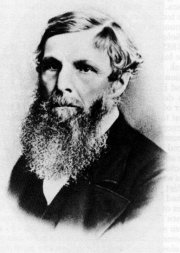
William Froude
Engineer, Deceased Person
1810 – 1879
Who was William Froude?
William Froude was an English engineer, hydrodynamicist and naval architect. He was the first to formulate reliable laws for the resistance that water offers to ships and for predicting their stability.
Froude was born at Dartington, Devon, England, the son of Robert Froude, Archdeacon of Totnes and was educated at Westminster School and Oriel College, Oxford, graduating with a first in mathematics in 1832.
His first employment was as a surveyor on the South Eastern Railway which, in 1837, led to Brunel giving him responsibility for the construction of a section of the Bristol and Exeter Railway. It was here that he developed his empirical method of setting out track transition curves and introduced an alternative design to the helicoidal skew arch bridge at Rewe and Cowley Bridge Junction, near Exeter.
At Brunel's invitation Froude turned his attention to the stability of ships in a seaway and his 1861 paper to the Institution of Naval Architects became influential in ship design.
We need you!
Help us build the largest biographies collection on the web!
- Born
- Nov 28, 1810
Dartington - Also known as
- Фруд, Уильям
- Siblings
- Nationality
- United Kingdom
- Profession
- Education
- Oriel College, Oxford
( - 1832) - Westminster School
- Oriel College, Oxford
- Employment
- Great Western Railway
(1837 - ) - Isambard Kingdom Brunel
- Great Western Railway
- Lived in
- Paignton
(1859 - )
- Paignton
- Died
- May 4, 1879
Simon's Town
Submitted
on July 23, 2013
Citation
Use the citation below to add to a bibliography:
Style:MLAChicagoAPA
"William Froude." Biographies.net. STANDS4 LLC, 2024. Web. 26 Apr. 2024. <https://www.biographies.net/people/en/william_froude>.

Discuss this William Froude biography with the community:
Report Comment
We're doing our best to make sure our content is useful, accurate and safe.
If by any chance you spot an inappropriate comment while navigating through our website please use this form to let us know, and we'll take care of it shortly.
Attachment
You need to be logged in to favorite.
Log In